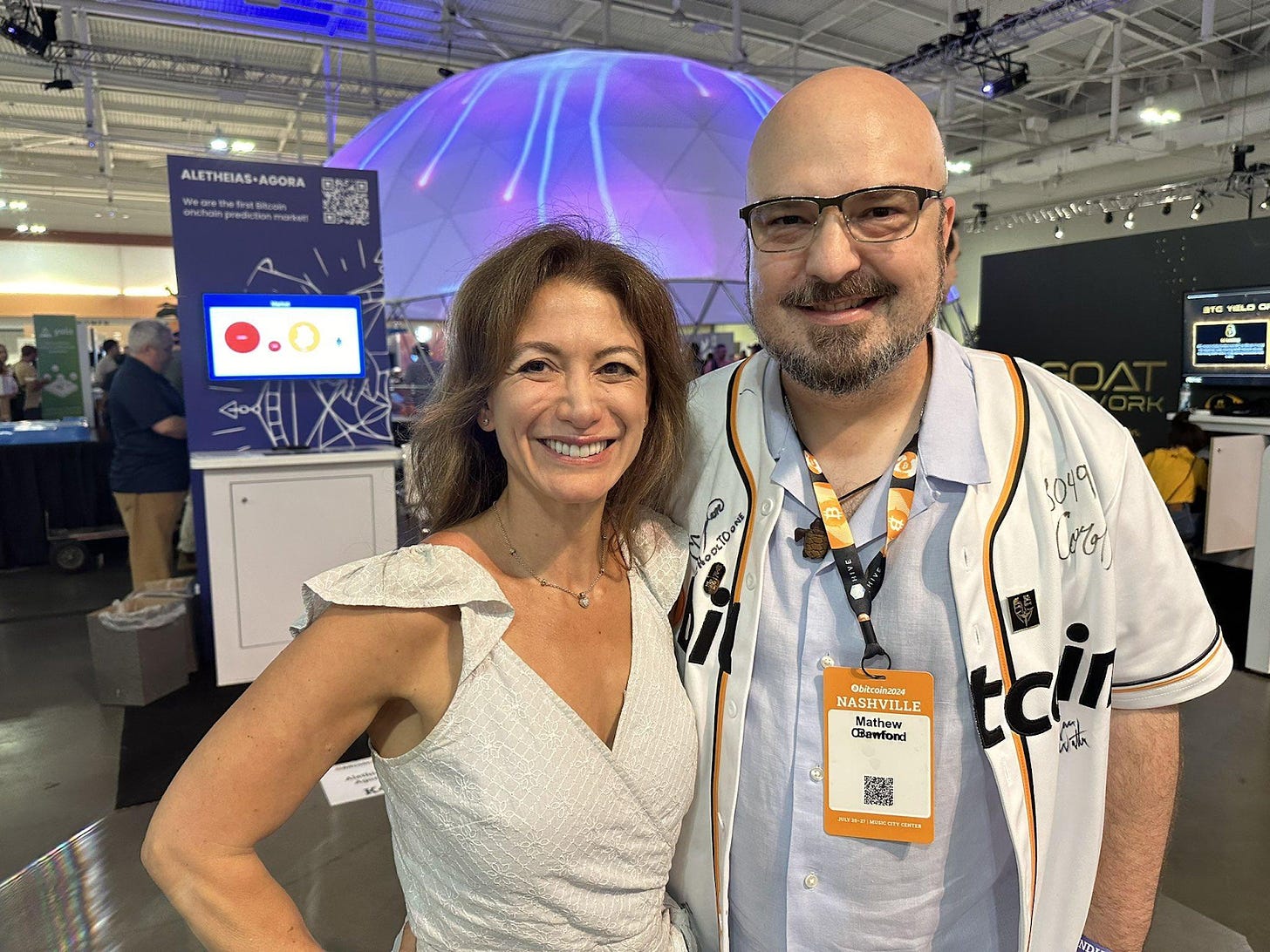Click here to see other articles on Chaos Agents. Some more active conversation about topics such as this can be found at the RTE Locals channel.
Last night I got home just before midnight from a six-day trip to Nashville for the 2024 Bitcoin Conference. I plan to write some about my first trip to a large Bitcoin conference, but for now I would like to share a conversation I had on the last day.
In the buildup to Trump's speech on Saturday, twenty-thousand people filled the convention center. One of those was a young man who chose to leave the Army in 2021 rather than get vaccinated. We fell into a conversation about the nice Bitcoin jerseys being sold by a young Canadian gentleman I met last year in Austin. Here I am wearing one such jersey when I met Courtenay Turner in person for the first time.
The conversation with the young soldier, whom I'll call Jim, struck me because he is recently married, but concerned about having children in a world like the one that we live in. I understand, and it breaks my heart. We have introduced so many chemicals in our world, some injected straight into the bodies of children, that we live in a bit of a toxic soup. That's bound to sort itself out in one way or another, but I hope the current conversations break through the current state of totalitarian verbal goo so that we can steer the ship better soon.
Part of that totalitarian verbal goo surrounds the military health database (DMED) that I worked on in 2022. As I spoke with Jim, he told me about the "alarming" DMED data, by which he meant the incorrect shock numbers promoted by whistleblowers and their lawyers (Thomas Renz and Leigh Dundas) at Senator Ron Johnson's hearing in early 2022. In particular, Jim mentioned a surge in "congenital malformations" in the data.
I tried to relax and explain to Jim that the whistleblowers were not interpreting the congenital malformation data correctly. For any readers who are still unaware, the DMED does NOT contain data representing any form of injury or illness among babies born to military personnel. Why not? Because babies aren't soldiers (true). The DMED is intended to track the health of soldiers. And while we might be interested in the health of the children born to soldiers, we would have to locate that data elsewhere.
Jim wasn't getting it, so I tried to explain it two or three times, more slowly and carefully each time, wary not to sound like I was trying to convince him that the mRNA quasi-vaccines are harmless. The DMED data certainly confirmed the stories of heart inflammation and various other side effects. I was both trying to tame my frustration, but I wound up letting Jim in on the fact that I was the statistician invited to work out the DMED data controversy. If appeal to authority can be used to good effect, that is sometimes in contradicting malinformation.
This is where Jim's brain shut down. He slowly questioned me about my claim to have worked on the DMED data. He was skeptical. And I get it. He saw some video in which Dr. Theresa Long expressed alarm about the babies. He watched Died Suddenly. He follows Steve Kirsch. But Jim was able to listen, but it wasn't clear how open his brain door got as I explained that none of the DMED data relates to birth defects.
I did not really want to be in the conversation after some point, and I took a text from my friend Julie, whom I was about to watch the Trump speech with, as my cue to get away. The job of helping somebody unwind their cognitive dissonance is always very hard. Dunbar hacking is a difficult job to clean up. And it may even be the case that many malinformation agents are unaware of the task for which they are deployed. How might we interpret this conversation between Long and Kirsch?
That's me responding to Kirsch at the bottom, thinking that I'm helping him understand the data. I had tried to explain to Long for weeks that she had the data wrong. She would even tell me one day that she didn't remember our hour-long previous conversation about it. Nobody would help slow her down, except that I tried to do so in a friendly way for as long as my patience lasted.
There were not 18,900 babies with birth defects in the DMED data for 2021 or any other year. In fact, there have never been 10,000 in a year. There has never been a year in which 18,900 babies were even born to service members. These numbers are either being used to construct malinformation, or Long has no idea how to read the data, and no number sense to rein in her mistakes (and she could not admit the need to learn more from people who can read the data better).
All this would just be perhaps a bit comical, but here we are two-and-a-half years later, and nobody has served as a conduit to get correct information in front of top military brass (at least, that's the story, whether or not it is accurate). And, perhaps as sadly, there are ordinary young Americans who, following the two-way propaganda war, are afraid of having children—not simply because of the vaccines, but because of the lack of commitment to data fidelity within the "Medical Freedom Movement."







Young people too scared to have kids seems more like a feature than a bug. The global depopulation agenda is very real, whether its:
- ruining peoples and killing them off
- promoting sex of all kinds and purposes other than reproductive
- promoting gender dysphoria and genital mutilation and
- scaring the shit out of young people.
As Bunk might say.. it's all in the Game, yo
Having a child is really an act of faith and hope in the future…and also a life-sentence and not for everyone for sure. I respect people who make a conscious choice not to have children. I want to comment on two things; first, our chemical -filled world—I totally agree we have been living in this, for decades. But I marvel at the resilience of our bodies and our world! Why isn’t everyone sicker? How do my elderly patients have rich lives and seem to be doing ok despite taking multiple medications and having had as many as 7 Covid shots? This preoccupies me — and I don’t have any other answer, other than to marvel at what I see and continue to observe. Secondly, on the DMED data, I would like to say that the bad data are everywhere, I have learned, since the Covid deception. Hence, people make decisions or draw conclusions based on these data, and probably more important is all the authorities and experts and organizations who make decisions and recommendations and as we know now—mandates—we have to fight all of this—all of the dishonesty, the lies. SO I am also preoccupied with how to do that—how to be ready to possibly get a person’s mind a bit more open to alternative data and assessments. It seems to me Mathew that you made an effort with the young man you met—what else can anyone do?